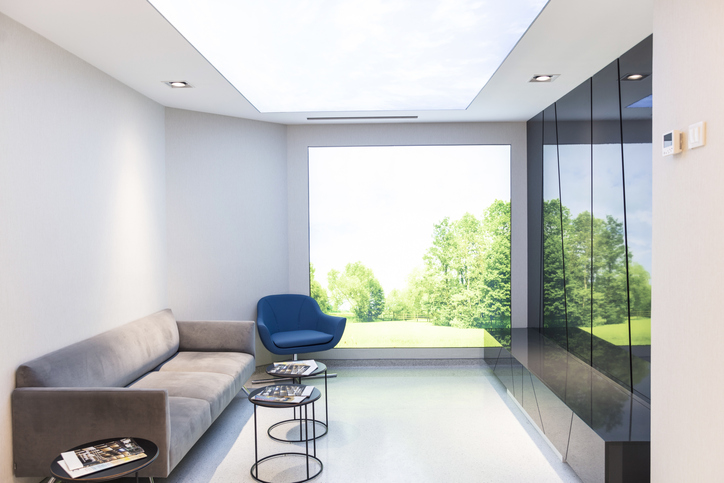Have you ever felt stiff shoulders and physical discomfort after spending long hours in an air-conditioned summer environment? In many cases, it is not uncommon to experience physical discomfort, particularly a feeling of heaviness around the shoulders, headaches, and fatigue that persist.
While air conditioning is essential for comfort, it can also cause body chills and muscle tension, aggravating stiff shoulders and other symptoms. Here we will identify the causes of stiff shoulders and other physical ailments caused by air conditioning, and provide detailed information on easy remedies and preventive measures.

Graduated from the Faculty of Medicine, National Kumamoto University. After serving as the director of major beauty clinics in Japan, etc., he opened Aladdin Aesthetic Clinic in 2023. He is a professional in aesthetic medicine with a doctorate in anti-aging research and many years of experience. With the motto of "Toward the realization of cosmetic medicine without lies," he aims to be the "Only One" together with his patients.
How air conditioning in summer causes stiff shoulders

Many people suffer from stiff shoulders and physical discomfort even when they think they are comfortable in the air-conditioned environment of summer. The reason why air-conditioning causes stiff shoulders is that the body cools down, causing muscles to stiffen and blood flow to slow down.
The cold can also affect the autonomic nervous system, causing you to feel discomfort in your overall health. Here is a specialized in-depth explanation of the mechanism by which cold air conditioning affects stiff shoulders.
Body cooling and muscle stiffness due to air conditioning temperature settings
Although air-conditioned rooms are comfortable, they are surprisingly taxing on the body's thermoregulatory system. Spending long periods of time in an environment with low air conditioning temperatures can cause the body to cool down due to the difference from the outside temperature, especially at the ends of the body such as the shoulders and neck, which are more easily exposed to the cold air.
Cold causes stiff muscles and blood flow, which in turn results in stiff shoulders. When muscles become stiff, blood does not circulate sufficiently, making it difficult for oxygen and nutrients to reach the body, which leads to fatigue in the shoulders and neck. Maintaining proper air conditioning temperature settings is important to prevent stiff shoulders.
Causes poor blood flow and muscle tension in the shoulders and neck
Deterioration of blood flow in a cold environment is another contributing factor to the development of stiff shoulders. When the body is cold, blood vessels constrict, restricting blood flow to the shoulder and neck muscles. This leads to a lack of oxygen and accumulation of waste products in the muscles, causing them to become tense.
When the muscles in the shoulders and neck become stiff, symptoms such as lethargy and pain occur, which may interfere with daily life. In particular, it is important to pay attention to the direction of the air conditioner breeze, because when the air conditioner breeze hits the shoulder and neck area directly, the muscles tend to stiffen due to the concentrated coldness in those areas.
Effects of prolonged use of air conditioning on the autonomic nervous system
Air conditioning causes more than just muscle tension and blood flow. When exposed to an air-conditioned environment for long periods of time, the autonomic nervous system, which regulates body temperature, is easily disrupted. The autonomic nervous system maintains normal body functions by balancing the sympathetic and parasympathetic nerves.
However, when the body is continually cooled by air conditioning, the sympathetic nervous system continues to dominate in an attempt to maintain a constant body temperature, causing an imbalance in the autonomic nervous system. If this condition persists, it can cause not only stiff shoulders, but also headaches, fatigue, and a variety of other physical ailments.
Symptoms of physical problems other than stiff shoulders
Cooling due to air conditioning can cause not only stiff shoulders but also a variety of other physical ailments. First, when the body is too cold, blood flow stagnates and oxygen and nutrients are not sufficiently distributed within the body. As a result, the head does not receive enough oxygen and tension headaches are more likely to occur. In addition, when the autonomic nervous system is disturbed by the effects of air conditioning, the body's rhythms are disrupted and chronic fatigue is often experienced. If these symptoms appear, paying attention to the temperature of the air conditioner and the direction of the wind can help prevent headaches and fatigue by ensuring that the body is not overcooled.
In addition, the chill caused by air conditioning can also affect blood flow to the eyes, resulting in eye fatigue and vision loss. In particular, the air in an air-conditioned room tends to dry out the eyes, increasing the risk of dry eyes. Because dry eyes can reduce their protective function and cause fatigue, which can temporarily affect vision, it is advisable to take moderate breaks and use a humidifier to prevent eye dryness, especially for those who overuse their eyes at a desk or other work place.
In addition, poor blood circulation caused by air conditioning can lead to the appearance of sensitivity to cold and numbness in the hands and feet. Prolonged exposure to cold air tends to stagnate blood flow to the hands, feet, and other terminal parts of the body, causing numbness and coldness to be felt more often. If this condition persists, the symptoms of sensitivity to cold are likely to worsen, and this can lead to a vicious cycle of even more poor blood circulation. To prevent these symptoms, it is important to keep the easily chilled parts of the body warm by using a stole or thin blanket in an air-conditioned room.
Let's improve stiff shoulders and poor health caused by air conditioning! What is the effective way?

If you are concerned about stiff shoulders and poor physical condition caused by air-conditioning, take easy remedial measures in your daily life to make your condition more comfortable. Here, we will explain in detail about stretching, warming care, and pressure points to relieve stiff shoulders and body caused by air conditioning. These methods can become important habits for those who are easily chilled in an air-conditioned environment.
Stretching|Basic stretches to relax the shoulder area
When the body is cooled by air conditioning, muscles tend to become stiff, so it is important to relax the muscles by stretching around the shoulders. If you are particularly concerned about stiff shoulders, it is a good idea to incorporate simple stretches into your daily routine.
- shawl (on shoulder of woman's dress)
Rotate both shoulders from front to back, then back to front. Move in large circles to relax the shoulder joints. This promotes blood flow and reduces stiffness in the shoulders. - Lateral stretching of the neck
Straighten your back, place one hand on the opposite side of your head and pull slowly, stretching the side of your neck. Do this three times for 10 seconds each side. This will stretch and relax the muscles from the neck to the shoulders. - Scapular Stretch
Fold your hands behind your back and stretch your chest as you pull your shoulder blades together. This stretches the front of the chest and shoulders and improves blood flow around the shoulder blades, which helps relieve stiffness in the shoulders.
These stretches are effective in relaxing muscles that tend to stiffen in an air-conditioned environment.
Warming|Care using hot towels or warm compresses
If your shoulders and neck are stiff from air conditioning, warming care is effective. Warming promotes blood flow, relaxes muscles, and reduces stiffness and fatigue.
- hot towel
Simply apply a towel heated in a microwave oven to the shoulders and neck to spread comfortable warmth and relax the muscles. Wrapping a hot towel around the neck increases the relaxing effect and is an easy way to take care of your neck while you are at work or doing housework. - hot compress
Applying a commercially available warm compress to the shoulders and neck provides sustained warmth and relieves muscle stiffness. It is especially effective when used in an air-conditioned office or before going to bed, when the shoulders tend to get cold.
Both help to warm the body from the core and relieve muscle tension caused by the body's cooling environment.
Pressure points|How to press pressure points for stiff shoulders
For stiff shoulders and other physical problems, pressing certain acupressure points can sometimes help. Try effective pressure points as simple self-care.
- Shoulder well
The shoulder well is an effective acupuncture point for stiff shoulders and is located exactly in the middle of the base of the neck and the tip of the shoulder. By pressing here with the belly of the finger at a comfortable strength and slowly relaxing it, stiffness in the shoulders can be easily alleviated. - Tenchu (heavenly pillar)
Located at the back of the neck, at the hairline, this acupuncture point promotes blood circulation from the neck to the shoulders. Using the thumb to lightly press and loosen the tenpus in small circles relieves tension from the neck to the shoulders and is effective in preventing headaches. - Goya
This acupuncture point is located between the thumb and index finger of the hand and is believed to be effective for stiff shoulders and headaches. Stimulating it by pressing into it with the opposite thumb improves blood flow and relieves shoulder tension.
Incorporating these pressure points into your daily routine can help relieve stiff shoulders and physical discomfort, and can be effective in taking care of the shoulder area in a cool air conditioned environment.
Preventive measures to prevent stiff shoulders caused by air conditioning
Although stiff shoulders and physical discomfort caused by air conditioning can be alleviated to some extent through daily self-care, it is also extremely important to create an environment that prevents stiff shoulders from occurring in the first place. Adjusting air conditioning temperature settings, air volume, and indoor humidity can prevent stiff shoulders by preventing muscle stiffness caused by the cold.
- Review air conditioning temperature settings (set appropriate temperature and airflow)
- Devices to avoid direct exposure of cold air to the body
- Regulate indoor humidity to prevent muscle cooling.
When humidity is low, humidity can be maintained by using a humidifier or drying wet towels indoors. If humidification is difficult in the office, using a portable humidifier or mist spray is also effective. By being aware of humidity control, you can create an environment where muscles do not get too cold and prevent stiff shoulders and physical discomfort.
What to do and what to do when stiff shoulders do not heal
In most cases, shoulder stiffness caused by air conditioning or cold can be remedied by daily self-care and preventive measures, but in some cases, it may not be enough to cure the problem. Chronic shoulder stiffness that persists or becomes severely painful can interfere with daily life, so appropriate measures must be taken.
If stiff shoulders persist for several weeks or do not improve with stretching or warming, consider consulting a specialist. Especially if the shoulder or neck pain is severe and accompanied by symptoms such as headache, nausea, or dizziness, it may not be just stiff shoulders but may be caused by other illnesses.
In addition, since stiff shoulders can be aggravated by stress and poor posture, you can ask for advice on how to prevent stiff shoulders from occurring by adopting posture improvement and relaxation. By consulting a specialist, you can clarify what measures your stiff shoulders need to be taken and expect early improvement.
- Check shoulder range of motion
- Neck movement
- Check for shoulder stiffness
- Range and intensity of pain
Before considering consulting a physician, it is important to first check your own shoulder stiffness. Use the self-check method above to check your shoulder stiffness symptoms and tension.
Watch out for stiff shoulders and health problems even during the colder months.

As mentioned earlier, cold from air conditioning can cause stiff shoulders and poor physical condition, but the same attention should be paid during the cold season as well. As the temperature drops, muscles become colder and blood circulation slows, making it easier for the shoulder and neck area to stiffen.
It is important to take measures to avoid suffering from stiff shoulders in any season, not just the cooler ones. Here are some ways to prevent stiff shoulders and physical problems during the cold season.
When the temperature drops, muscles cool down and blood circulation is reduced, which can cause stiff shoulders
In cold weather, blood vessels contract in an attempt to maintain body temperature, preventing sufficient blood flow to the extremities. In particular, the muscles around the shoulders and neck tend to tense up due to the cold, and when blood circulation deteriorates, stiff shoulders are more likely to occur.
Since cold muscles can become stiff and stiff shoulders can become chronic, it is important to keep the shoulder area warm during the cold season. Use a scarf or stole when going outside, and try to keep the shoulder and neck area cool even indoors.
Creating an indoor environment that maintains humidity and prevents cooling
During the cold season, it is easy for the interior to become dry and the muscles as well as the skin can easily become cold. As the cold and dryness increase, body heat is lost and muscles become tense, making stiff shoulders and poor physical condition more likely to occur. Maintaining indoor humidity at 40-60% will help create a comfortable environment where the body does not get too cold. Use humidifiers, place houseplants indoors, dry wet towels, and other easy ways to adjust humidity.
It is also important to be careful to control the temperature when turning on the heater and to avoid sudden temperature changes. Be careful not to get too cold when moving back and forth between a warm room and a cold hallway.
Incorporate light exercise and stretching to relieve tension in the body
Although it is easy to become inactive during cold weather, light exercise and stretching are effective ways to prevent stiff shoulders. In particular, full-body stretching and warming exercises that promote blood flow help to relax muscles and relieve tension in the body.
- Exercise to move the shoulder blades
Exercises that pull the shoulder blades together and apart are effective in relieving shoulder stiffness. Fold your arms behind your back, pull your shoulder blades together as if opening your chest, and take slow, deep breaths repeatedly to relax your shoulder muscles. - Stretching to relax the neck
Straighten the spine and slowly roll the neck from side to side to stretch the muscles. Relaxing and relaxing the sides of the neck also reduces tension in the muscles around the shoulders.
Incorporating moderate exercise into your daily life during the cold season will help keep your body cool and prevent stiff shoulders and other health problems. As your body warms up, blood flow improves and the muscles around your shoulders remain flexible, so please try to incorporate this into your daily life.
summary
Shoulder stiffness and physical discomfort caused by air conditioning can often be prevented with proper temperature and airflow adjustment, daily stretching and pressure point exercises, and other habits. In environments where people tend to feel cold, warming the shoulder area and adjusting the humidity level can help improve symptoms. If symptoms do not improve after taking measures on your own or if they become chronic, it is important to seek professional advice. Maintain a comfortable routine and a healthy body through daily care.
At Aladdin Aesthetic Clinic, based on our many years of experience in cosmetic medicine and cosmetic dermatology and the knowledge of our doctoral degree, we provide counseling that aims to be "only one", offering the best treatment for each person we meet. We offer only the necessary treatments without any unnecessary information or suggestions.
Feel free to use our official LINE account for 24-hour counseling and reservations. Please feel free to contact us for free counseling for the first time or if you have any concerns.






